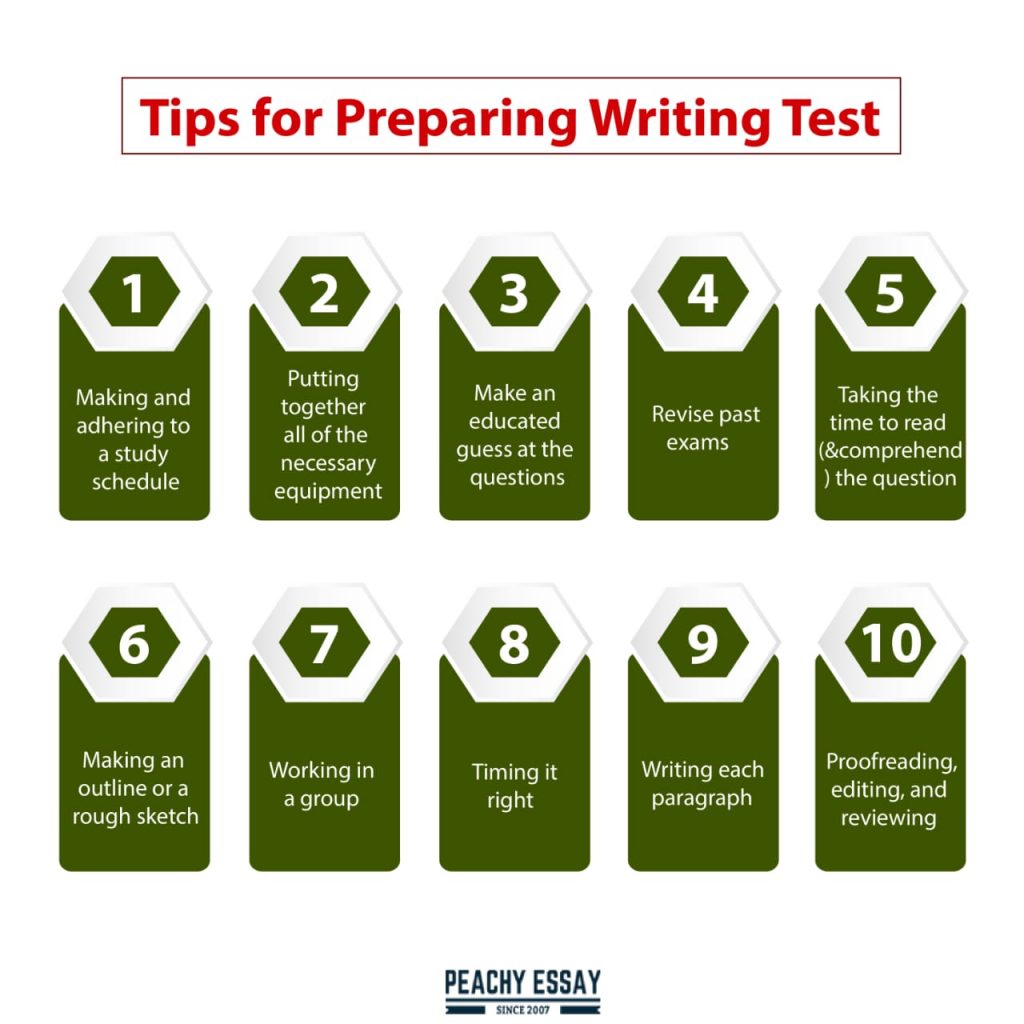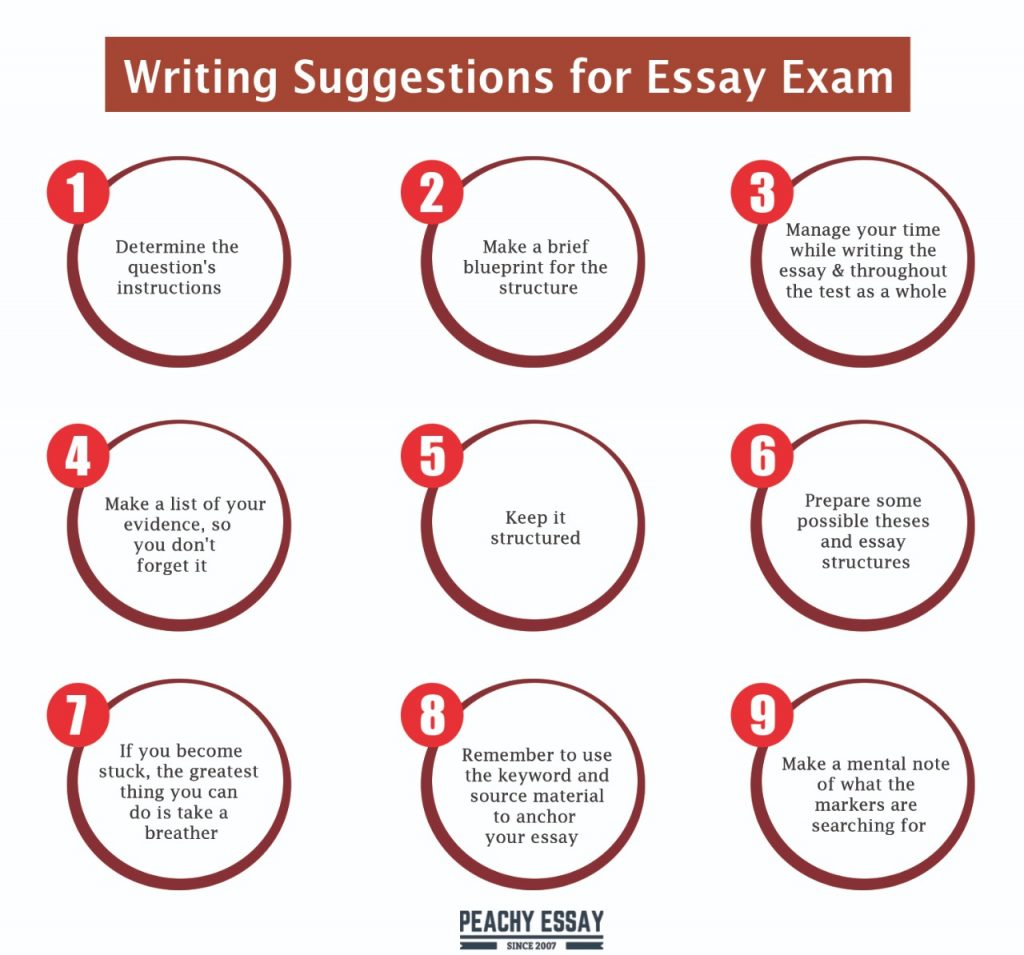Exams require you to understand a difficult and sometimes long topic, formulate a clear thesis statement that answers the issue, and produce an essay that develops and supports that argument. It also necessitates that you do all of this under time constraints.
To meet these difficulties, you’ll need to study in a manner that allows you to identify both the course’s main themes and concepts, as well as the particular facts, events, authors, or instances linked to those themes.
This article will walk you through the steps that lead up to the essay test. It will emphasize the importance of preparation and a helpful technique to utilize when you begin writing. While there is undeniably a great deal of anxiety connected with essay-based examinations, you can ensure your success by developing a strategy and putting it into action on test days.
Here’s how to be ready for your writing test.

Making and adhering to a study schedule
Exam preparation is an important part of the process. Still, essay examinations may be tough to prepare for since there is a lot of material and revision notes to go over, but only one (or two) essays to write.
As the final examinations approach, you may be required to use a variety of essay exam methods. Your teacher may provide you with a selection of potential test questions from which you may choose one for the essay-based exam. They might give you a list of topics and the essay question on the day of the exam, or they could give you no information (other than your course curriculum) and wish you luck. You’ll approach your studying differently depending on the knowledge you have, but in all instances, you’ll begin studying at least a week before the test date.
Remember that studying for 8 hours a day is an unattainable goal while preparing for your essay test. Your mind will wander, and you will not be making the greatest use of your time.
Instead, make a schedule that you believe you’ll be able to stick to. Make sure these times aren’t too early or too late, but rather fall within what you believe is your most concentrated time of day, such as first thing in the morning if you’re an early riser. Break up your study time into 20-30 minute pieces, with a break in between. You will teach your brain to stay concentrated while avoiding some distractions, such as social media, in this manner.
Once you’ve created your essay exam strategy, attempt to stick to it every day for the best results.
Putting together all of the necessary equipment
Your teacher will have informed you which tools are allowed (and which are not) during a written test while you were studying for it. Rather than attempting to locate all of the parts on test day, try to put them together the day before so that you have one less thing to worry about. A pencil, pen, highlighter, and some scratch paper are required at the very least. We also recommend that you have something to drink on hand and keep hydrated.
You will be allowed to utilize your notes, textbook, lecture notes, or other sources of knowledge in certain examinations. If that’s the case, make sure you have them on hand and that they’re arranged in a manner that makes sense to you. Hopefully, you have prepared for the exam by studying these course materials. These indicators can help you locate the data you need quickly and effectively if you highlight or underline key bits of information ahead of time.
Make an educated guess at the questions
When instructors create essay questions, they typically go over the material they’ve taught and attempt to develop subjects that will challenge students to connect the course’s main ideas. You will participate in the same procedure by predicting the questions that will be on the test. Examine your syllabus, lecture, and reading notes, as well as your study guide. What ideas or themes have emerged throughout the course of the semester? If you were the professor, what questions would you ask?
Revise past exams
It may be extremely useful to reference past examinations when guessing problems and preparing for an essay exam. While it is unlikely that your professor will ask the same questions on your test, it may be useful to get a feel of the kinds of questions that have been asked before. Some instructors provide outdated examinations to their students. If this isn’t the case in your class, look, for example, questions in your textbook, syllabus, or assignment instructions. There are several excellent internet sources, for example, questions from textbook publishers, but be cautious while doing so. Some crowdsourcing platforms promote academic dishonesty, and students should never post outdated test questions or answers.
Taking the time to read (and comprehend) the question
We may get so anxious in an exam that we begin writing without first reading the whole question. Don’t be a victim of this. You must study the question from beginning to finish and seek indications of what the course teacher is looking for. Your teacher will almost certainly include certain keywords in the essay question, and if you know what they mean, you’ll be in a better position to answer the question completely.
Here are some of the terms they may use in an essay question (and what they mean):
- Describe: This is probably the simplest to write about since it involves listing traits, qualities, or components.
- Compare: This asks you to look at the similarities and differences (typically the most significant) between two items. Contrast is when you look at two items in opposition to each other (so you highlight the differences).
- Discuss: this one needs you to create a discussion (essentially a compare AND contrast).
- Evaluate: The teacher is asking you to express your viewpoint, explain your case with the help of other people’s views, and provide proof to back up your claim.
- Analyze: You’ll need an argument or a viewpoint to analyze. Then, break down the argument into smaller pieces and debate or interpret each one separately. Your teacher may also write ‘critically analyze,’ implying that you must cite academic sources as proof. To summarize, you would need to take a larger argument and reduce it down, leaving out many of the nuances in this instance. You may also add any significant findings that have been recorded.
- Interpret: you must explain the meaning. This is accomplished via the use of examples and the description of connections.
As you can see, an instructor’s comments may indicate to you, the student, what you are expected to accomplish. You are putting yourself at a disadvantage if you overlook certain keywords or phrases since you did not read the entire instructions. So, when reading, be attentive and concentrated.
Making an outline or a rough sketch
Jumping right into writing after grasping the issue may seem tempting, but it isn’t always the ideal strategy.
Spend at least a few minutes thinking about what you’re going to write. When you begin writing your test essay, this will really speed up your writing process. While you don’t want to spend a lot of time preparing every detail, creating a short but focused essay outline can save you time thinking after you’ve begun writing and ensure that all of your paragraphs address the test topic right from the start.
Working in a Group
One of the most effective methods to learn new information is to discuss it with others. You will get a better grasp of the course not just by explaining ideas or topics to others but also by hearing their perspectives on the course’s key problems.
Study groups may be a wonderful complement to solo study activities, especially if you are about to take an exam and need to know course material. Each group member might provide one or two possible test questions, and the others in the group could attempt to answer them. Alternatively, the whole group may go through the course curriculum and identify key themes, especially difficult topics. You will improve your comprehension and prepare for your essay test by discussing the material with others.
Timing it right
There’s nothing worse than discovering you’re running out of time halfway through a test; therefore, you may be wondering how to write essays quicker in examinations. The simplest solution is to prepare a strategy for answering essay questions in an exam environment.
As one of your essay test methods, you should have developed a short mind map or outline by now. Now, for each paragraph, establish a reasonable objective for yourself. If you know you’ve set aside 10 minutes for each paragraph, do your best to adhere to that schedule.
Remember that it is preferable to create well-organized paragraphs that are simple to read than to enter a large amount of data illogically. If you have a clock on your computer (or in your study space), make sure you can quickly look at it to stay on schedule.
Furthermore, although time is essential, it is also beneficial to improve your typing abilities. You will have more time to write down your thoughts if you can increase your accuracy and speed. This, on the other hand, should be seen as a long-term goal that you may strive toward during your degree.
Writing each paragraph
A paragraph is a collection of actions. Following the same structure for each paragraph not only makes it easier for you to write, but it also makes it easier for the marker to read. This is a win-win scenario for everyone!
‘There are numerous methods to write an essay,’ you may assume, and you would be right. However, since it will take too much time, being really innovative in your essay writing is usually not the ideal approach.
Proofreading, editing, and reviewing
It’s tempting to type the last word of the conclusion and submit the document. You’ve put in a lot of effort up to this point, and you’re probably eager to finish the exam. It is, nevertheless, a smart choice to resist that desire. If you have any time left over after your essay test, use it to go over what you’ve written and make sure you’re not losing points for stupid errors.
To verify that you have fulfilled the assignment requirements, go back to the instructions and find parts of your essay that fit the question prompts directly.
The next step is to check for trivial mistakes when proofreading. One of the advantages of taking an essay-based test at home is that you may read aloud without fear of being judged (unless by your cat, of course). Reading aloud can help you spot run-on phrases and areas where a comma or full stop is needed if you can’t complete your statement because you’re out of breath.
Reading aloud may also help you spot odd sentences and instances when you’ve used the same word many times in a row. Investing the time to do so may result in additional one or two marks, which could be the difference between an upper second and a first.
Essay Exam Tips
Here are some essay writing suggestions to assist you in completing your work throughout your examinations.

Determine the question’s instructions
It would be best if you studied every word of the essay question very attentively before you begin writing. Make sure you’re following directions and paying attention to the little details that add up to a lot. Do you need to prepare a speech or an essay? Do they say you’ll need ONE, at the very least ONE, or TWO or more relevant texts? There are no excuses for missing this step since you can do it while reading.
Make a brief blueprint for the structure
In a test, always, always, always plan your essays. Like… all the time. When you start a test, the rush of frightened adrenaline may urge you to start writing right away, but spare yourself a world of misery by planning. Basically, you’ll want to put down your thesis (which you’ve presumably already prepared but will adapt to the particular question) and the arrangement of your body paragraphs.
Manage your time while writing the essay and throughout the test as a whole
There are two suggestions here (lucky you), but the main one is to manage your time when writing the essay and during the test. So, first and foremost, you must provide adequate time before the test to complete your essay. If the test is anything like English Paper 1, you know that an essay makes up a third of the (two-hour-long) exam, so you should start it with at least 40 minutes left.
When it comes to drafting the essay, the framework you devised will indicate whether or not you are on track. You only have 40 minutes to compose an essay with an introduction, conclusion, and four body paragraphs. So, it’s fairly obvious that you should finish your introduction and the first two paragraphs in 20 minutes. If you’ve screwed up the scheduling of the whole test and don’t have all 40 minutes, ramp up the pace; if you can’t, it’s time to make some fast choices about what to cut.
Make a list of your evidence, so you don’t forget it
This isn’t required, but it may be very beneficial. Evidence is required in every essay. Quotes, dates, and statistics are all possibilities. Even if you’ve remembered them to a tee by the HSC (lol), it’s important putting a plan in place to ensure you get all of your proof in. Scribble that proof (or simply a term to refresh my recollection) at the top of my planning page or beneath the plan you created before beginning to compose the essay. That way, if my memory went blank when writing a particular paragraph, I didn’t have to leave the evidence out or spend time trying to recall it.
Keep it structured
This one is somewhat linked to the last point regarding planning, but hey, we can’t stress it enough. It’s too tempting to start rambling and throwing concept afterthought onto the paper while writing essays for examinations. To make your essay as clear and powerful as possible, create a framework throughout your preparation and adhere to it religiously.
Prepare some possible theses and essay structures
Memorizing essays is a touchy subject, but I believe we can all agree that you should have a few concepts and possible essay formats before entering the test room. Some of us will attempt to memorize whole essays word for word, which isn’t officially advised, but it shouldn’t be that difficult if you’re willing to (and know how to) adjust it to the question. It’s all about figuring out what method works best for you, but having a few different essay formats and flexible thesis ideas on hand will ensure that you produce an excellent essay in under 40 minutes.
If you become stuck, the greatest thing you can do is take a breather
It’s not a pleasant feeling to have a blank mind during a test since the time is actually ticking, and there’s no way to recall a quotation or come up with an idea suddenly. It will seem quite tense, but instead of continuing to waffle, your best option is to stop and ponder.
Waffling has an impact on the lucidity of your essay as well as the grading criterion for your response’s “composing.” It may also influence how well the marker believes you comprehend your argument; therefore, it’s always best to take a breather and allow yourself a few seconds to develop a solution. If you cannot do so, either go on and try again later, cut your losses, end the point, and move on.
Remember to use the keyword and source material to anchor your essay
Although not every essay will provide you with the source material (an image or quotation to which you must refer), the question will always include a verb or phrase that instructs you on how to frame your argument.
Make a mental note of what the markers are searching for
The most important advice for writing test essays is to remember what your examiners are searching for. This does not imply that you tell your mysterious, most likely middle-aged NESA marker what you think they want to hear.
Instead, consider your essay carefully. Your examiner is interested in how effectively you comprehended the texts and how the writers conveyed their views. They’re looking to evaluate how well you grasp the idea of Discovery and all of its intricacies. They’re also interested in seeing how effectively you can tie all of these concepts together and convey them in a logical, consistent way. Don’t get caught up in jargon or too complicated methods; you’ve got this.




